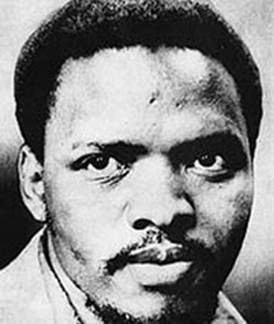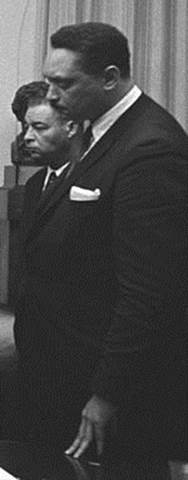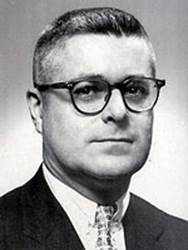In 1978, at an automotive conference in Detroit at the Renaissance Center, I looked for and found the Reverend Leon Sullivan, the African-American preacher from Philadelphia who had been on the board of directors of General Motors for eight years. I told him: "I'm the Ford Motor Company financial analyst for both South Africa and Ford Aerospace, and I need your help."
The background to my request was the racist apartheid government of South Africa, which was still in power at the time. A particularly outrageous incident one year before had been the beating to death by the South African police of Steve Biko, a black activist. The rest of the world was outraged.

Steve Biko, South African anti-apartheid leader
In 1974, Sullivan was one of GM board members who visited South Africa on company business. At the airport, on their back out of the country, Sullivan was stopped and strip-searched--because he was black -- while the white members of the group were allowed to pass through security without incident.
This experience motivated Sullivan to create a set of guidelines for American corporations to adhere to when doing business overseas -- the Sullivan Principles.* Since principle number one was that the work place should be racially integrated, this would mean the South African government would be pressured to change its policies to keep GM's business.

Reverend Leon Sullivan, creator of the Sullivan Principles
I wanted to speak to the Reverend Sullivan that night, but I knew I had to be discreet, as we worked for the two top competitors in the automobile industry. My office at Ford was on the tenth floor of the "glass house" -- the nickname for Ford's World Headquarters, which overlooked much of Dearborn. I was a rapidly rising executive on the Finance Staff. To our team -- in spite of the existence of General Motors -- we ruled the automotive world!
As both a Ford South Africa and Ford Aerospace analyst, I was bumping into ethical issues every day. Ford's Aerospace division manufactured satellite and surveillance equipment that, among other customers, was sold to South Africa. In my opinion, this was morally wrong. Ford should not be selling this kind of technology to repressive governments.
I repeatedly raised this issue to management, and was supported by J. Edward Lundy, our senior vice-president of finance, and John Sagan, Ford's charismatic treasurer. Lundy's support was crucial, as he was a member of the famous group of "Whiz Kids" that had revolutionized the company after World War II. Lundy's office was on the 12th floor, next to those of Lee Iococca Phillip Caldwell and Henry Ford II himself. But, after a year and a half of discussion, nothing had been accomplished, while the situation in South Africa was getting worse. Ethically, I had to act.

Joseph Edward Lundy, Senior VP, Ford finance staff
I was to meet Reverend Sullivan in a hotel across the street from the Renaissance Center. Finally, he walked into the lobby: "I'm Leon Sullivan. It is nice to see you again." "I'm Steve Mariotti, and I am a big fan of yours." We sat and talked for over an hour and he spoke to me about his Principles. He nodded sadly when I told him of what I had heard in a meeting, that, unbeknownst to Ford's management, our equipment was being used by the South African government to spy on members of the anti-apartheid movement, such as Biko and Nelson Mandela (imprisoned at that time).
I said that I would like to adopt his ideas at Ford, but I was a "lowly" grade eight analyst. I wasn't sure how they would be viewed in the company outside of the Finance Staff, where I knew I had support. He encouraged me to adjust the Principles to fit Ford's particular situation, and then "work my way up," avoiding confrontations that could destroy my career, and thus put a premature end to whatever influence I could ultimately exert.
It was one of the most influential meetings of my life, and I went back to work with renewed energy to define what I thought the overseas ethical policies at Ford should be. This included coming up with a framework that would filter out those governments that were oppressive, to whom it would be immoral to sell wire-tapping equipment.
Inspired by my midnight meeting with Reverend Sullivan, I shortly thereafter wrote a memo that was presented at the Finance subcommittee meeting. It argued that we adopt an overseas policy of conduct based on the Sullivan Principles. Much to his credit, Mr. Ford got involved and set up a committee of 30 to study the issue.
I knew change was coming when John Sagan asked me to come to his office and showed me what Mr. Ford had written on the top of my presentation: "I agree with Steve!" Soon afterwards, we stopped selling our surveillance equipment to South Africa, and to all non-democratic governments. I am extremely proud of my part in this historic shift of American corporate policy.
I left Ford in November of 1979 to go into business for myself. The Reverend Sullivan and I remained friends for life. In the late 1990s, he paid a visit to the Network for Teaching Entrepreneurship, the nonprofit I had founded in 1987. We spent an hour and a half chatting, and he showed me one of the many fan letters I had written to him some 20 years before. He then took me along to a meeting of New York City officials where he was to present a revised Sullivan Principles for municipal governments. When we walked in, he introduced me as the guy that had helped to change Ford's overseas corporate policies.
In April of 2001, Reverend Leon Sullivan died. He had revolutionized American business forever with the creation of the Sullivan Principles. He should be better known to the general public. He was truly a great man. I am proud to say that he was both a friend and mentor.
*The Sullivan principles: 1. Non-segregation of the races in all eating, comfort, and work facilities. 2. Equal and fair employment practices for all employees. 3. Equal pay for all employees doing equal or comparable work for the same period of time. 4. Initiation of and development of training programs that will prepare, in substantial numbers, blacks and other nonwhites for supervisory, administrative, clerical, and technical jobs. 5. Increasing the number of blacks and other nonwhites in management and supervisory positions. 6. Improving the quality of life for blacks and other nonwhites outside the work environment in such areas as housing, transportation, school, recreation, and health facilities. 7. Working to eliminate laws and customs that impede social, economic, and political justice. (Added in 1984)
